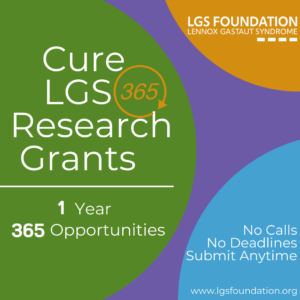Cure LGS 365 Research Grant Recipients
The LGS Foundation is dedicated to funding the highest caliber research on LGS

We focus on research projects to find new treatments and improve the quality of life for individuals impacted by Lennox-Gastaut Syndrome. The LGS Foundation places a high priority on funding research that addresses the biology of LGS and has a clear path to clinical application and/or therapeutic development. Research applications undergo rigorous scientific review and are judged principally on the novelty of the hypotheses, innovation, scientific quality, strength of the approach, the likelihood of success, and, importantly, projects relevant to the needs of the LGS patient community.
Learn more about our research funding
2023 Grant Recipients
Previously Funded Grant Recipients
Previous LGS Foundation Funded Research Grants
 Brian Grone, Ph.D.
Brian Grone, Ph.D.
University of California, San Francisco
A Zebrafish Model for LGS
Project Summary: Mutations in the human syntaxin-binding protein 1 (STXBP1) gene are associated with a range of clinical outcomes. They were first identified in children with early infantile epileptic encephalopathy and subsequently found in patients diagnosed with other forms of epileptic encephalopathy including infantile spasms, Lennox-Gastaut Syndrome, and Dravet Syndrome. Despite progress in understanding basic functions of STXBP1, exploring the consequences of these mutations would benefit from well-characterized animal models. Zebrafish are a leading organism with which to model human neurological disease and epilepsy in particular. We will use zebrafish as a model for LGS as we explore in more detail the impact of STXBP1 mutations.
 Elizabeth Thiele, MD, Ph.D.
Elizabeth Thiele, MD, Ph.D.
Massachusetts General Hospital
Low Glycemic Index Treatment in Patients with LGS
Project Summary: Lennox-Gastaut Syndrome (LGS) is a highly refractory seizure disorder characterized by multiple seizure types, a slow spike-and-wave EEG pattern, and cognitive impairment. LGS also impacts development and cognition, often with effects that are quite severe. The ketogenic diet has long been an effective alternative to antiepileptic medications in refractory epilepsy, but is very restrictive, leading to decreased compliance and, therefore, efficacy. Low glycemic index therapy (LGIT) is an attractive alternative to the ketogenic diet. The glycemic index (GI) refers to a food’s tendency to raise blood glucose, and the LGIT is based on a diet of foods with a low glycemic index. The purpose of this study is to assess the efficacy of the LGIT as therapy for epilepsy in LGS.
 Brian Grone, Ph.D.
Brian Grone, Ph.D.
University of California, San Francisco
A Zebrafish Model for LGS
Project Summary: Mutations in the human syntaxin-binding protein 1 (STXBP1) gene are associated with a range of clinical outcomes. They were first identified in children with early infantile epileptic encephalopathy and subsequently found in patients diagnosed with other forms of epileptic encephalopathy including infantile spasms, Lennox-Gastaut Syndrome, and Dravet Syndrome. Despite progress in understanding basic functions of STXBP1, exploring the consequences of these mutations would benefit from well-characterized animal models. Zebrafish are a leading organism with which to model human neurological disease and epilepsy in particular. We will use zebrafish as a model for LGS as we explore in more detail the impact of STXBP1 mutations. Elizabeth Thiele, MD, Ph.D.
Elizabeth Thiele, MD, Ph.D.
Massachusetts General Hospital
Low Glycemic Index Treatment in Patients with LGS
Project Summary: Lennox-Gastaut Syndrome (LGS) is a highly refractory seizure disorder characterized by multiple seizure types, a slow spike-and-wave EEG pattern, and cognitive impairment. LGS also impacts development and cognition, often with effects that are quite severe. The ketogenic diet has long been an effective alternative to antiepileptic medications in refractory epilepsy, but is very restrictive, leading to decreased compliance and, therefore, efficacy. Low glycemic index therapy (LGIT) is an attractive alternative to the ketogenic diet. The glycemic index (GI) refers to a food’s tendency to raise blood glucose, and the LGIT is based on a diet of foods with a low glycemic index. The purpose of this study is to assess the efficacy of the LGIT as therapy for epilepsy in LGS.Updated 03/26/2024

















